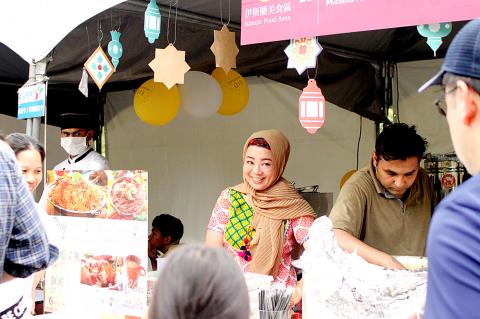The Islamic Cultural and Halal Food Festival may not be the first thing that comes to mind when one thinks of festive year-end events in Taipei. But the open-air festival at Daan Forest Park promises to have something for the entire family.
This weekend, more than 70 vendors offering Islamic food, crafts and cultural experiences will set up shop along the park’s pathways. Visitors can try out Arabic calligraphy and henna and shop for wares drawn from around the Muslim world.
It will be a rare opportunity to catch many of Taiwan’s small, online businesses in the flesh: La Femme Dromadaire stocks lamps, figurines and burnous (Berber tunics) hand-made in Tunisia; Camel Hump Stay will bring Moroccan leather bags and shoes; and From Syria offers up delicate woven earrings and pouches made by female refugees from the war-torn country.

Photo: Davina Tham, Taipei Times
Visitors can also look forward to a picnic with freshly-served food and drink from a range of Indian, Turkish and Moroccan vendors. Some unusual treats to look out for include food from North Africa, intense brews from Saturn Landing Turkish Coffee and baklava from the Taiwan outpost of Zalatimo Sweets, a 159-year-old Jordanian sweetsmaker.
The festival is co-organized by the Chinese Muslim Association (中國回教協會) and Taipei City Government.
■ The Islamic Cultural and Halal Food Festival takes place tomorrow and Sunday, 10am to 5pm

Photo: Davina Tham, Taipei Times
■ Daan Forest Park (大安森林公園), 1, Xinsheng S Rd Sec 2, Taipei City (台北市新生南路二段1號)

Most heroes are remembered for the battles they fought. Taiwan’s Black Bat Squadron is remembered for flying into Chinese airspace 838 times between 1953 and 1967, and for the 148 men whose sacrifice bought the intelligence that kept Taiwan secure. Two-thirds of the squadron died carrying out missions most people wouldn’t learn about for another 40 years. The squadron lost 15 aircraft and 148 crew members over those 14 years, making it the deadliest unit in Taiwan’s military history by casualty rate. They flew at night, often at low altitudes, straight into some of the most heavily defended airspace in Asia.

Many people in Taiwan first learned about universal basic income (UBI) — the idea that the government should provide regular, no-strings-attached payments to each citizen — in 2019. While seeking the Democratic nomination for the 2020 US presidential election, Andrew Yang, a politician of Taiwanese descent, said that, if elected, he’d institute a UBI of US$1,000 per month to “get the economic boot off of people’s throats, allowing them to lift their heads up, breathe, and get excited for the future.” His campaign petered out, but the concept of UBI hasn’t gone away. Throughout the industrialized world, there are fears that

Like much in the world today, theater has experienced major disruptions over the six years since COVID-19. The pandemic, the war in Ukraine and social media have created a new normal of geopolitical and information uncertainty, and the performing arts are not immune to these effects. “Ten years ago people wanted to come to the theater to engage with important issues, but now the Internet allows them to engage with those issues powerfully and immediately,” said Faith Tan, programming director of the Esplanade in Singapore, speaking last week in Japan. “One reaction to unpredictability has been a renewed emphasis on

Taiwan’s democracy is at risk. Be very alarmed. This is not a drill. The current constitutional crisis progressed slowly, then suddenly. Political tensions, partisan hostility and emotions are all running high right when cool heads and calm negotiation are most needed. Oxford defines brinkmanship as: “The art or practice of pursuing a dangerous policy to the limits of safety before stopping, especially in politics.” It says the term comes from a quote from a 1956 Cold War interview with then-American Secretary of State John Foster Dulles, when he said: ‘The ability to get to the verge without getting into the war is